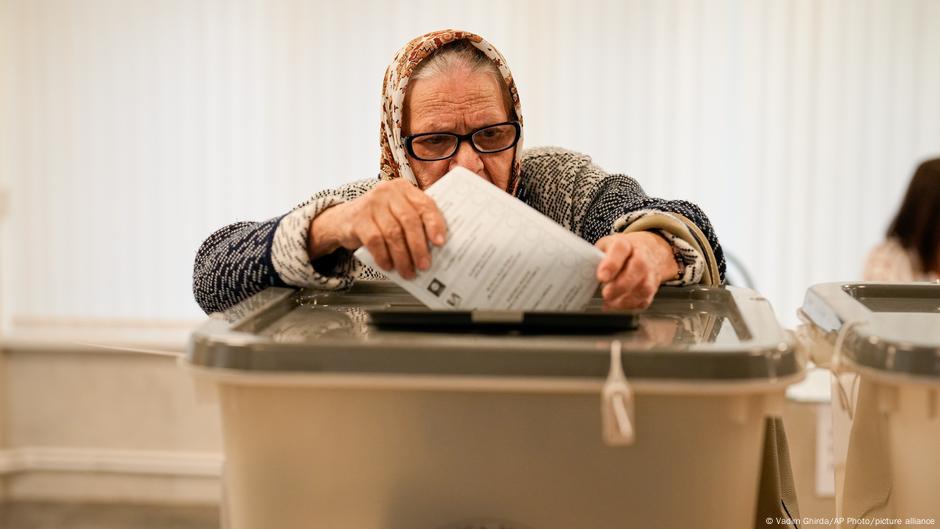Listen to the article
In the shadow of Moldova’s election battle, journalists face mounting attacks and psychological toll from Russian disinformation campaigns, according to media experts tracking the escalating threats against press freedom in the Eastern European nation.
Journalist Mihail Sirkeli of Nokta.md experienced firsthand the intimidation tactics when he received a staggering 380 phone calls in a single day during the lead-up to Moldova’s September 28 elections.
“It was obviously an attempt to scare me,” Sirkeli told the Institute for War and Peace Reporting. “Both Russian propaganda and local propaganda serving Russian interests are stirring up hatred at an unprecedented level.”
Moldova, a small republic of just 2.4 million people, might seem an unlikely focal point for extensive disinformation operations. However, its position as a former Soviet republic sharing a border with Ukraine has made it a prime target for Russian influence campaigns, particularly as Moldovans chose between pro-European and pro-Russian parties.
While journalism in Moldova remains relatively independent with legal protections for press freedom, the atmosphere has grown increasingly hostile. Attacks on journalists have surged over the past three years, with 66 cases reported in 2024 alone, creating significant psychological pressure on media workers.
To address this growing crisis, DW Akademie and its local partner, the Association of Independent Press, established the Helpline for media workers—a specialized psychological support service for journalists facing threats, harassment, and burnout.
Doina Ipatii, a psychotherapist who spent more than a decade working as a journalist, leads the psychological support efforts. “There are several main reasons why people have been reaching out to the service,” Ipatii explained. “A high level of anxiety related to the election, exhaustion due to long working days, and bullying and threats they receive.”
The program began with group trainings but has found that one-on-one sessions provide more effective support, allowing journalists to speak candidly about their experiences. So far, the Helpline has provided more than 275 hours of psychological support to media workers.
“This is one of the few projects like this we have in Moldova,” Ipatii noted. “Psychological support for journalists is something pretty new.”
The psychological impact on journalists is particularly severe due to their constant exposure to disinformation and hate speech. Many report that personal attacks can lead to trauma, which Ipatii says depends on having support systems and time to process traumatic events.
Russian-speaking independent journalists face unique challenges, often caught in a difficult middle ground. They regularly engage with the country’s Russian-speaking minority population—the primary target for Russian disinformation—while facing suspicion from both sides of the linguistic divide.
“The journalists do not belong to any group,” Ipatii explained, noting that these professionals face anti-Russian sentiment from Romanian speakers who mistake them for disinformation actors, while Russian speakers expect them to align with pro-Russian narratives.
In the autonomous Russian-speaking region of Transnistria, a breakaway section recognized only by Russia and select allies, no media are allowed to report freely. Similarly, in the predominantly Russian-speaking regions of Gagauzia and Taraclia, independent journalists face regular harassment from both authorities and local populations.
Despite what observers estimate was a $300 million Russian disinformation and election interference campaign, Moldova’s pro-European party secured a decisive victory, a result widely celebrated across Europe as a triumph for democratic values and independent media that had exposed Russian interference efforts.
However, this success came with significant personal costs for journalists who felt increasingly targeted for their work exposing disinformation networks.
“For many journalists, the endpoint of the stress of their work can be burnout and even giving up as journalists,” said Olena Ponomarenko, DW Akademie’s program director for Moldova. “Helpline is here to provide support for independent journalists and media workers so that they can continue to fill their necessary role in Moldovan democracy.”
The Helpline for Psychological Support operates as part of the European Union-funded TRIMEDIA project, jointly implemented by the Association of Independent Press and DW Akademie, with additional support from Germany’s Federal Ministry for Economic Cooperation and Development.
Fact Checker
Verify the accuracy of this article using The Disinformation Commission analysis and real-time sources.




10 Comments
It’s worrying to see the psychological toll this is taking on Moldovan journalists. They’re on the frontlines of a high-stakes information battle, with their personal wellbeing at risk. This kind of intimidation can have a chilling effect on media independence.
Kudos to the journalists in Moldova who continue to report the truth in the face of such intense pressure and harassment. Their courage and commitment to their craft is truly admirable.
It’s alarming to see the psychological toll this is taking on these frontline workers. Their wellbeing and ability to do their jobs freely is crucial for Moldova’s democracy.
This is a concerning report on the psychological toll disinformation campaigns can take on frontline journalists. Moldova’s position bordering Ukraine makes it a key battleground for information warfare, as Russia seeks to sway its population.
It’s troubling to see the level of harassment and intimidation Moldovan journalists face from both Russian and domestic pro-Russian propaganda. Their ability to report freely is crucial for a healthy democracy.
The high volume of calls to harass a single journalist highlights the scale and relentlessness of these disinformation efforts. Moldova may be a small country, but it’s clearly a priority target for Russia’s information manipulation tactics.
Protecting press freedom in the face of these escalating threats is vital. Journalists need strong legal protections and public support to continue their important work of exposing the truth.
Moldova’s position as a former Soviet republic bordering Ukraine makes it a prime target for Russian influence campaigns. This report underscores the vital importance of supporting and protecting journalists on the frontlines of this information battle.
This report highlights the critical role independent journalism plays in countering disinformation, even in smaller countries like Moldova. Safeguarding press freedom should be a priority for protecting democracy.
The sheer volume of harassment calls is a disturbing tactic. It speaks to the sophisticated, relentless nature of Russia’s information warfare tactics targeting vulnerable nations like Moldova.